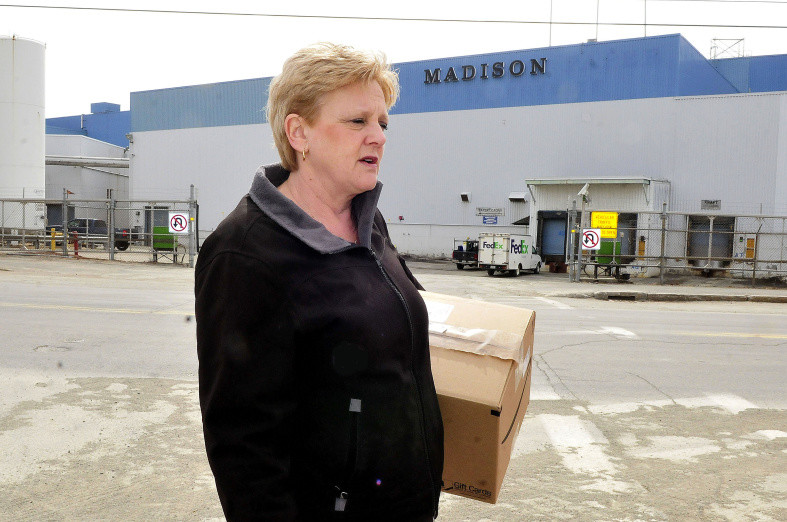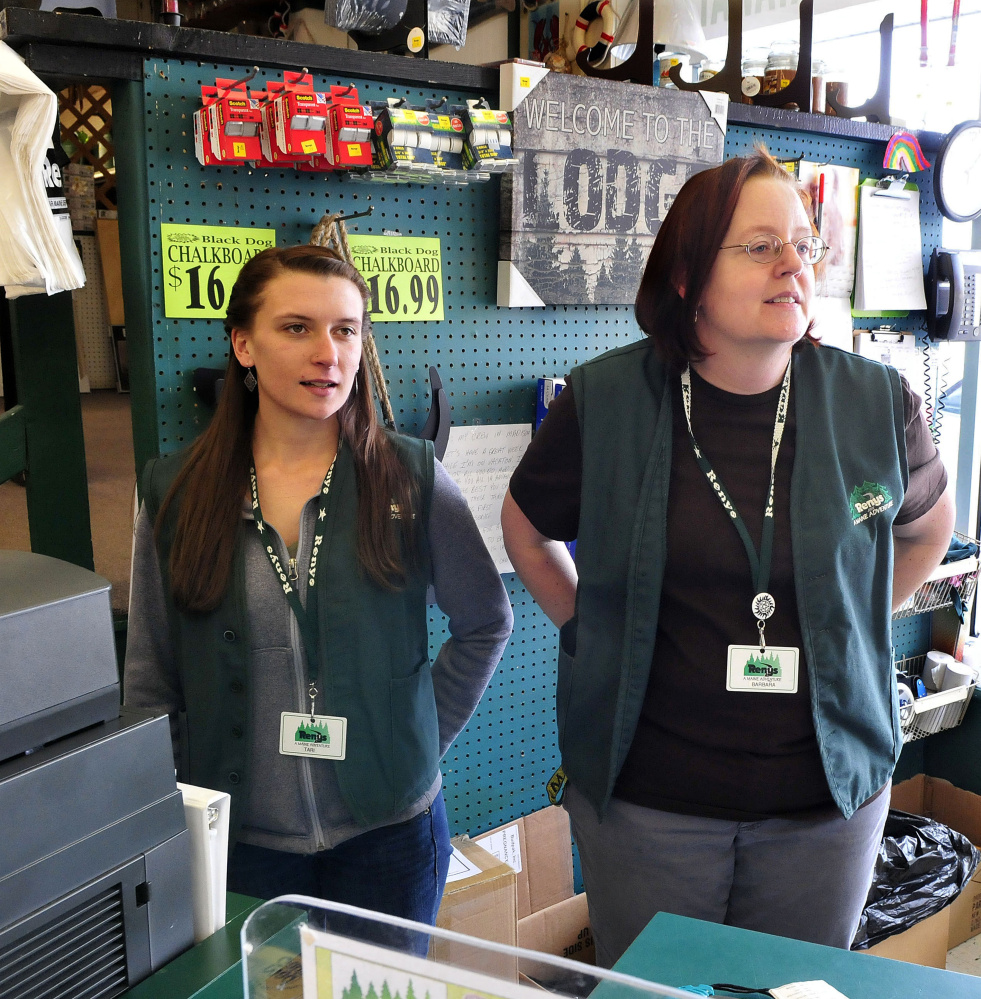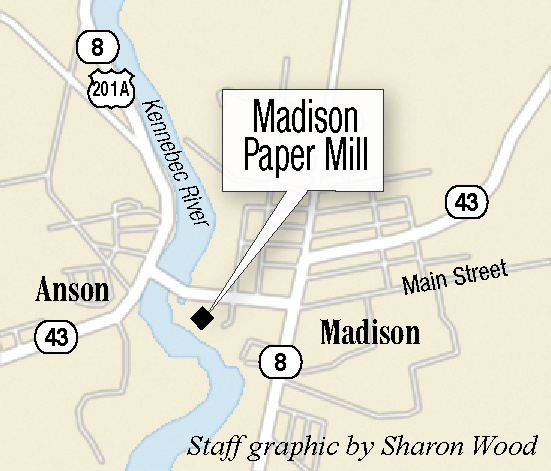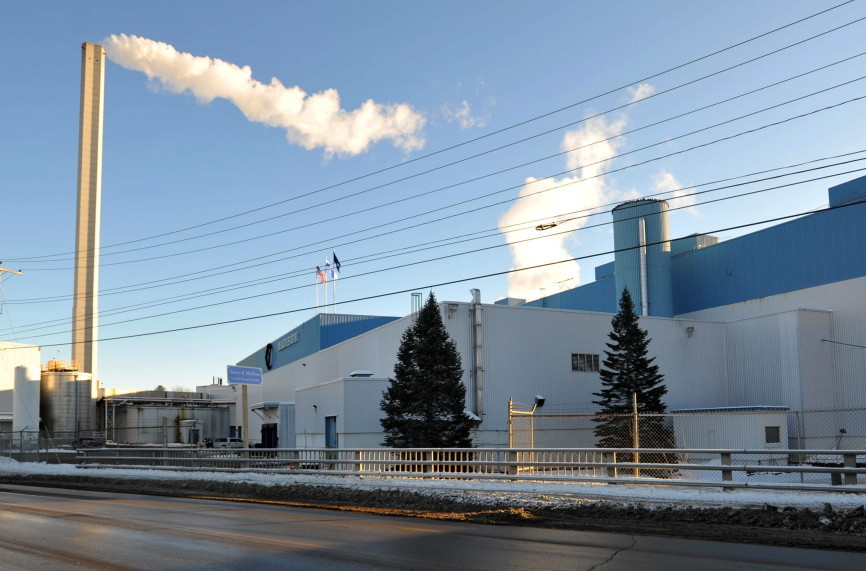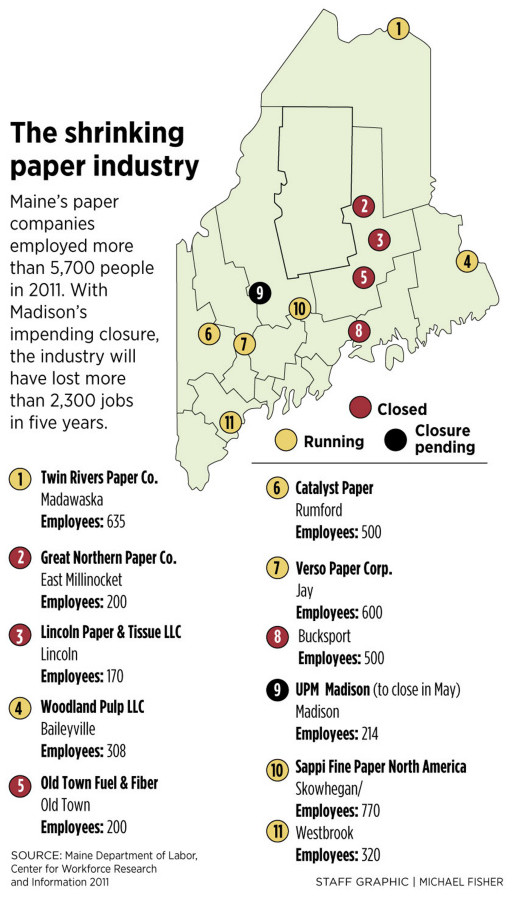MADISON — After 35 years working at Madison Paper Industries, Lori Christopher is preparing for her last day after the mill announced Monday it will close in May.
“Everything is going to have a domino effect,” said Christopher, 55, as she stood outside the plant Monday afternoon. “It’s going to be kind of a ghost town. It will affect the schools because taxes are going to go up, and they’re going to stop the programs they don’t need. Even the pizza places will be affected, because no one is going to come here to eat if they aren’t coming here to work.”
A Madison resident and secretary in the mill’s engineering department, Christopher is one of about 214 employees who will be out of work. The mill’s parent company, UPM-Kymmene Inc. and Northern SC Paper Corp., announced the closure in a press release Monday morning, citing as a main reason a decline in demand for supercalendered paper, the glossy magazine paper made at the Madison mill.
Madison Paper’s announcement is just the latest in a series of bad news for Maine’s legacy paper industry. Although some mills continue to operate profitably, such as Sappi Fine Paper in Skowhegan and Woodland Pulp in Baileyville, the domestic paper industry has been grappling with declining demand and cheaper imports, leading in recent years to mill closures, bankruptcies and layoffs.
“Despite everyone’s best efforts, the difficult decision has been made to cease paper production at Madison,” Ruud van den Berg, senior vice president of UPM Paper Europe and North America, said in a release Monday morning. “Demand for supercalendered papers declined significantly in 2015 and the decline is expected to continue. The Madison mill is not cost-competitive and has lost a significant amount of sales in the recent past.”
The closure of the mill will reduce the company’s production by a total of 195,000 tons of paper.
Some employees will remain beyond May to maintain buildings, operate a 27-megawatt hydropower generation facility there and support activities related to the closing. The paper business will end, and hydro power assets at the mill site will be sold.
“It’s another sad, sad day in the state of Maine,” said Mike Croteau, president of the United Steelworkers Local 36, one of two unions at Madison Paper, in an interview Monday. “It’s another paper mill that we’ve lost in the last few years.”
In the last 16 years, demand for newsprint has declined 15 percent and for glossy paper between 30 and 50 percent, according to an industry analyst.
Once employing more than 18,000 workers at its height in the 1960s, the paper-making industry has lost more than 1,500 jobs in the last two years.
Not counting Madison Paper, there are just six operating paper mills left in Maine. Kelsey Goldsmith, a spokeswoman for the Maine Pulp and Paper Association, said in a statement Monday that despite the announcement from Madison Paper and the loss of jobs, the industry remains one of the most important in the state and still employs thousands of people.
“We owe it to the 214 employees deeply affected by today’s announcement and the remaining papermakers employed in mills across the state to take action,” Goldsmith said. “We must ensure that the remaining Maine mills keep their doors open, thereby empowering those mills’ management teams to continue the innovation and investment that has been key to the industry’s success and survival in Maine during these globally challenging times.”
COMMUNITY IMPACT
On a nearly deserted Main Street in Madison Monday afternoon, some residents and a local official said they were not surprised by the mill’s closing.
“We’ve seen the nature of the paper industry declining for several years,” said Town Manager Tim Curtis. “Every time there’s a change in ownership, anytime the property values are affected or the worldwide market of paper is affected, people have these conversations. That’s why we say it’s not a surprise, although it’s going to have its ramifications, for sure.”
Although the mill’s precarious position may not have been a surprise, State Rep. Jeff McCabe, D-Skowhegan, said Monday the more than 200 workers at the mill have been “blindsided” by the news.
“I met with workers just last week and heard no hint of this,” McCabe said. “It’s yet another example of how unfair trade agreements are crushing the middle class in our country, especially in Maine. These manufacturing jobs are vital to the economic health of communities across Maine. I am committed to making sure that our workers have the training they need for the jobs we now have and the ones we will have moving forward.”
Several business employees and owners agreed that the impact of the mill’s closure would be felt throughout town, which has a population of about 4,800.
“We’re definitely going to feel it. We get so much local business here,” said Barbara Vischer, a cashier at Renys department store. She said residents have feared the closure of the mill for some time, but that doesn’t make it easier to deal with.
“Main Street has kind of been coming back in the last year or so,” said Vischer, who lives in nearby Starks. “It’s really kind of booming with new businesses, but those businesses aren’t going to stay if they don’t get customers coming in.”
“I don’t feel very good about it,” said resident Stephen Foshay, who runs the Anson-Madison Information Booth downtown. “It’s going to impact all of us — the residents, all the businesses.”
About 60 of the mill’s more than 200 employees live in Madison, according to Curtis, who said the mill employs about the same number of people as Backyard Farms, a commercial tomato farm in Madison. The mill is also the town’s largest taxpayer, even after a $150 million drop in value in 2014.
The state Department of Labor said in a statement that Commissioner Jeanne Paquette and the department’s rapid response team spoke with the human resources managers of Madison Paper Industries. All told, projected layoffs at the mill could total as many as 220 workers, the department said. The department’s rapid response team planned to meet with company officials soon to set up a plan of action, including filing for trade assistance and working with other partners.
“Our team can answer questions families will have over the next two months and help them plan for this transition,” Paquette said in a statement. “Our assistance is not limited to unemployment benefits, but includes information about health insurance options, career planning, training support and job search guidance.”
The department said workers in the Madison area are served by the Wilton and Skowhegan CareerCenters.
LAWMAKERS REACT
State and federal lawmakers issued statements Monday expressing sympathy for the workers at Madison Paper and their families and pledging to work with them as the mill closes.
State Rep. Larry Dunphy, an unenrolled member from Embden, said he worked at Madison Paper for 35 years “with some of the best, most skilled people in the industry.”
“This is heartbreaking news for Somerset County,” Dunphy said.
U.S. Rep. Bruce Poliquin, R-2nd District, said he “will not give up the fight” to preserve the state’s pulp and paper industry, while U.S. Sens. Susan Collins and Angus King released a joint statement calling the closure “devastating” and said it underscores “the need to launch renewed economic development efforts in communities across rural Maine.”
“The mill has been a huge economic driver for our area, and this closure is upsetting news for our entire region,” said state Sen. Rod Whittemore, R-Skowhegan, who represents District 3 that includes Madison. “I will continue to seek solutions for making it cost effective for mills in Maine to keep operating and to prevent future closures. However, right now, as we digest this news, our focus must be on supporting those who earn their paycheck and support their families by working at the mill.”
But other reactions highlighted the difficulty in addressing the industry’s challenges through legislative action.
Gov. Paul LePage, a Republican, said in a statement that Madison’s paper closure highlights the challenges “Maine companies face in the national and global marketplace.”
“That’s why it is more important than ever to make sure Maine is competitive in attracting new job creators and retaining existing companies by lowering taxes, reducing energy costs and providing a welcoming atmosphere for businesses and capital investment,” LePage said.
The Professional Logging Contractors of Maine issued a statement on the mill’s closure that renewed its call to the LePage administration and state legislators “to take action to sustain the Maine logging industry before it is too late.
“Maine’s forest products industry needs direct action by the state’s elected officials if it is to survive,” Dana Doran, executive director of the group, said in a statement. “For Maine loggers, the closure of Madison Paper means the loss of the last major buyer of spruce-fir pulp in the state. Now is the time for our elected officials to support legislation to help loggers and the industry.”
MARKET OUTLOOK
Some industry experts and an attorney representing the Industrial Energy Consumers Group, a public interest group of which Madison Paper is a member, question whether the state of Maine is doing enough to keep the paper industry alive and whether those efforts can overcome a declining market.
Maine is at a disadvantage compared to other paper-producing areas because of high energy costs and barriers to transportation, said Jesse Marzouk, an industry analyst.
“They haven’t really solved any of the structural problems,” Marzouk said. “The transportation network is still high compared to other places. Energy costs are still high compared to other places and that hasn’t changed, so Maine will probably continue to be disproportionately hurt.”
While Madison Paper seemingly overcame unfair market conditions last year after the U.S. Trade Commission approved placing permanent duties on supercalendered paper being imported from Canada, “sometimes all the trade action in the world can’t save a market if the market is dying,” said Lloyd Irland, a Maine-based forest industries consultant.
Tony Buxton, an attorney who lobbies on behalf of the Industrial Energy Consumers Group, called the closure of the mill a “man-made tragedy that could have been avoided” and said a main reason why the mill was not competitive is because of a shortage of natural gas availability in Maine. The high prices have led to several shut-downs and temporary layoffs for employees at Madison Paper.
Monday’s announcement follows several temporary production curtailments at Madison Paper, in which officials have cited high gas prices, including the most recent which reduced the mill’s production from seven days per week to five days per week and reduced hours for employees. Prior to that, employees endured several temporary layoffs in 2015.
Buxton criticized state officials for not moving fast enough on building more gas pipeline in Maine.
“Maine has recognized since 2013, when we passed the Omnibus Energy Act, that energy costs are like pneumonia — they take companies that are a little marginal and make them even more marginal. It’s something we could fix, and frankly we are not doing enough about it,” he said. “It’s not enough to mourn the loss. We have to do something to stop it.”
Rachel Ohm — 612-2368
Twitter: @rachel_ohm
Send questions/comments to the editors.


